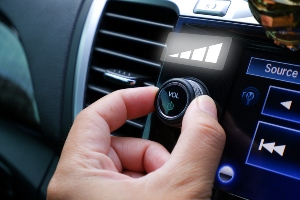Loud music while driving has become more common due to better car stereos and easy access to music. While enjoyable, it can be dangerous. Playing music at high volumes can affect driving skills and make accidents more likely.
Table of Contents
If you were involved in a car accident due to loud music, you may be eligible to pursue compensation. Our Charleston car accident lawyers can walk you through your legal rights during a free consultation.
Call today to learn about your potential legal rights. 1-844-RESULTS.
Risks of Driving With Loud Music

Drivers have a legal duty to stay focused on the road. Loud music can become distracting and disrupt a driver’s ability to pay attention, which could lead to following types of distractions:
Cognitive Overload
Drivers may experience cognitive overload when the brain is overwhelmed by too many things happening at once. For instance, loud music with complex lyrics could leave drivers with less mental capacity to process important information.
A driver could be too busy singing the lyrics to a song and fail to see a traffic light or stop sign, causing them to fail yield the right of way. This could in a crash if another vehicle is already traveling through the intersection.
Auditory Distraction
Auditory distractions are external sounds that prevent drivers from hearing vital cues on the road or highway. Loud music is an auditory distraction that conceals crucial environmental noise around you as you drive. For instance, it can conceal sirens, horns and tire screeches. If drivers cannot hear emergency vehicles approaching, it could lead to a serious crash involving another driver or emergency vehicle.
Attention Shifts
Loud music can cause drivers to shift their attention between listening to music and paying attention to the road. This shift can result in delayed responses to changes in traffic conditions or obstacles.
For instance, if a driver is engaging in their music, they may not realize that they must slow down due to traffic congestions. As a result, drivers may not react swiftly to sudden changes, causing them to rear-end a vehicle in front of them.
The Impact of Loud Music in Charleston
Driving in Charleston is already tricky due to its historic cobblestone streets, busy tourist areas and community events. Loud music can present these driving challenges:
Narrow, Historic Streets
Charleston’s historic district is beautiful, but has some narrow streets that limit visibility. Drivers must stay alert for other cars, pedestrians and cyclists. Loud music can muffle sirens and horns that distract drivers, making it harder to notice the signs of potential hazards and increasing accident risks.
Heavy Tourist Traffic
Tourist traffic in Charleston can create unpredictable driving conditions. Visitors may not be familiar with local road rules or the flow of traffic, particularly if they end up on one of the many one-way streets. Loud music can distract drivers from adapting to these unpredictable patterns, making it harder to navigate safely through busy downtown areas.
Pedestrian-Friendly Zones
Charleston is known for its vibrant pedestrian zones, including Broad Street and Rainbow Row. Pedestrian-heavy areas require extra vigilance. Drivers playing loud music might not notice pedestrians crossing streets or walking near the road, increasing the risk of pedestrian accidents.
How to Reduce Car Crash Related to Loud Music
Understanding the risks of loud music is the first step toward safer driving. Here are practical strategies to mitigate these risks:
Keep Volume at a Safe Level
One of the simplest ways to reduce the risks associated with loud music is to keep the volume at a moderate level. Ensure that the music does not overpower important sounds from the environment. The general recommendation is to keep the volume low enough so that you can hear sirens and other critical auditory cues.
Choose Music Wisely
The type of music you listen to can have an impact on your driving. Fast paced or highly energetic music can be more distracting than soothing or instrumental music. Opt for music that is calming and less likely to cause cognitive overload. Instrumental tracks or music with fewer lyrics may be less distracting and help you to maintain focus.
Avoid Distractions While Driving
Adjusting the music or making changes to the audio system while driving can be distracting. Minimize these interactions by setting up your playlist or radio stations before you start driving. If you need to adjust your any settings, pull over safely before doing so.
Be Mindful of Your Well-Being
Your own state of mind and physical condition play a role in how music affects your driving. If you are feeling tired or stressed, loud music can exacerbate these feelings and impair your driving further. Ensure that you are well-rested and in a good mental state before getting behind the wheel.
How Claims May Be Affected in Loud Music Related Car Crashes?
Every case is different. However, if loud music contributes to an accident, it can be a factor in determining liability. In car accident cases, distractions like loud music may be considered when assessing fault. A car accident due to someone being distracted, could mean they are at-fault for the car crash. Since South Carolina is an at-fault state, the driver liable for the crash is responsible for covering your medical expenses and other damages. However, you need to speak to an attorney to know your specific legal options.
Contact Roden Law Today
After a car crash, call our firm to discuss your potential case further. Our lawyers at Roden Law want to help you get the compensation you deserve.
We can answer your legal questions during a free consultation. There are no upfront cost or fees to speak to our attorney about the details of your scenario.
To learn more call: 1-844-RESULTS.
